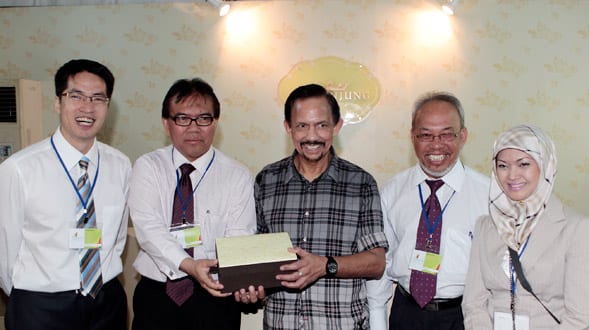- His Majesty the Sultan and Yang Di-Pertuan of Brunei Darussalam at the Serijunjung brand launch with Lawrence Chong, Director of Strategy Development at Consulus; Rawi Ahmed, Director at Consulus; Hj Sapawi Bolhassan, Country Director at Consulus Brunei; and Karmila Sapar Account Executive at Consulus Brunei. Photo by HM Zailaney.
Brunei has launched its first brand of luxurious biscuits that will harness the capabilities of small enterprises to churn out cherished Malay delicacies for consumers in international cities like London, Dubai and Tokyo.
The Ministry of Industry and Primary Resources (MIPR) and consultants yesterday launched Serijunjung, which will be the vehicle for Brunei’s small and medium enterprises (SMEs) to reach upscale markets abroad.
A box of these biscuits, that will be baked with the discriminating palate of consumers in international cities in mind, will go for US$60-80 ($85-110). The aim is to begin shipping the goods by the end of 2010.
Singapore-based Consulus Pte Ltd has worked with the MIPR for the development of the brand and its marketing strategies the past six to eight months.
Lawrence Chong, Consulus director of strategy development, said: “Actually the challenge Brunei is facing is that the country is not dealing with medium enterprises, but with cottage industries which are very small enterprises. They (set their sights on a) niche (market) with no demand locally,” Chong said in an interview with The Brunei Times at the opening of the Agriculture and Agrifood Expo 2009 at the Tungku Agricultural Development Area yesterday.
He said that based on his company’s experience in the global market and dealings with cake franchise Begawan Solo, Brunei’s Serijunjung brand can be successfully marketed worldwide.
“There is currently no premium pastry or biscuit brand in existence. Mid- or low-range brands already exist which are conquered by Malaysian and Indonesian brands, so Brunei will not stand out in that range. Hence, the idea for Serijunjung became the best choice because if the brand is not at the premium range, it cannot afford to pay for something handmade or crafted which a lot of (Bruneian) enterprises are doing in their homes,” he said.
Chong acknowledged that people have a preconceived notion of Brunei, which could also be a challenge, but, by this branding strategy it is possible to break those notions through good design and concept.
“Serijunjung means homage, (and) with a bit of link to the Malay Islam Monarchy it is wonderful and can lead to endless possibilities in terms of international trademark,” he said.
The brand will use the tagline “For Honour and For Love”.
Chong said the plan is to position Serijunjung as a brand that is rooted in Brunei’s traditions.
“The patterns on boxes (for the biscuits) are all taken from different aspects of Bruneian patterns, embroidery and inspiration. That’s what we really wanted because in the international market, anything typically Western won’t stand out. So the only way, ironically, to stand out is to be as cultural and as authentic as possible, which is what Serijunjung is all about,” Chong said.
Using cultural elements to make the brand distinct will make it successful, he said, noting that Western consumers go for products that contain Asian elements.
“Serijunjung is very high-end and will only be sold in cities like London, Dubai and Tokyo. It’s like a carrier to bring bakers’ skill and delicacies to these places. We are recommending to the government to open branches in these cities for obvious reasons. In Tokyo, people really appreciate Malay culture, while in London and Dubai, Brunei already has a strong ground there,” he said, adding that the brand might not open anywhere else, not even in places like Singapore. The first place where the brand is made available will give everyone an impression of its quality.
Revenues from the brand will go back to the SMEs to help support their growth.
“The covers will be embroidered and boxes are hand-made from wood. This will support three industries at once wood, handicraft and bakers. All these are traditional industries in Brunei so when each box gets sold they represent the handiwork of Brunei,” said Chong.
Serijunjung’s packaging will also include a note to introduce the chef or baker who made the product, said a Consulus representative.
He stressed that global branding is important as a social responsibility and instead of saying that the finest ingredients are used and it is handmade, each box will include a note. This kind of setting works in the high-end market, he said.
“Each cookie is wrapped in high-quality paper and the different types of cookies will be selected by the MIPR. The first issue here is that the products have to be of export quality. The ministry will be short-listing those that are capable of producing (at consistent quality),” he said.
This concept is good for entrepreneurship, Chong said, because they are looking for a product that is exciting, innovative and high-end, similar to Italy and Switzerland that have traditional industries like handmade chocolate and woodcraft.
“Brunei should really look at that instead of trying to be something else,” he said.
Since the concept has been approved, Chong said that they will now move to short-listing SMEs. They plan to talk about financing or helping seek funding for SMEs from financial institutions.
“Through this initiative, which requires a dedicated funding effort, jobs will be provided for Bruneians as the brand will need people to pack, wrap and market it,” he added.
“This is a brand by Bruneians. We are just the catalyst, but the brand has to run on its own in the future,” he said.
Chong said he was confident consumers will pay for the brand especially if it were socially responsible and helpful to communities.
“The brand will feature the entire process of production and everything is socially and ecologically friendly. The shops will use all natural woods and, again, this gives people a sense of getting in touch with the Bruneian culture but done in a modern contemporary way. It is natural but modern and fashionable, the boxes can be even bought to be put on display,” he said.
Once the manufacturing process is up and running, “we can then look at who to assign to manage the packaging process because a lot of businesses will be part of this chain so it will support a lot of industries by including as many of them as possible”.
The concept hopes to help revive traditional industries which are critical for Brunei’s identity.
To aid in the success of the project, a cooperative similar to the idea of Fonterra of New Zealand will be set up.
This initiative will be led by the MIPR which will gather promising SMEs to produce the biscuits for the brand.
The concept will also support three traditional industries such as wood craftsmen, seamstress and bakers.
For a small industry, only a premium product can make this model viable. The concept will also shape global perceptions about Brunei by showcasing traditional designs in contemporary forms presented in the best cities of the world.
Consulus’ Chong said the product has a lot of market potential since no one has looked at the richness of Malay culture. “Globally people are tired of typical western brands and are looking for surprising and yet unique Asian concepts, I believe Serijunjung will be that kind of experience,” he said.





